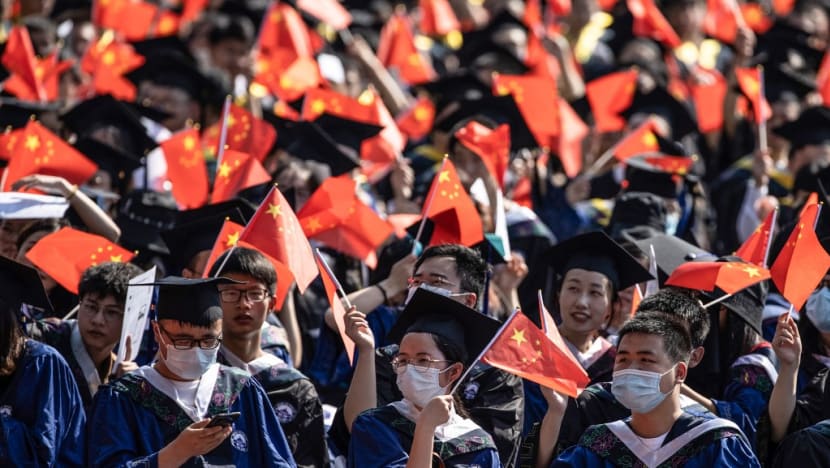More university graduates in China turning to smaller cities for employment: Report
Improved incomes, less pressure and keeping closer to family were among the reasons given by young Chinese for seeking employment farther afield.

Graduates of Wuhan University wave national flags as they attend the graduation ceremony in Wuhan, in China's central Hubei province on Jun 23, 2021. (File photo: STR/AFP)

This audio is generated by an AI tool.
SINGAPORE: More university graduates in China are choosing to look for jobs in smaller cities instead of in typically coveted locales such as financial hub Shanghai and capital Beijing, according to a new report.
The report by Chinese education consultancy MyCOS looked at statistics on university graduates from the class of 2018 to 2022. It found that the percentage of graduates employed in county-level localities six months after graduation rose from 20 per cent for the 2018 cohort to 25 per cent for 2022.
The report also found that for the combined 2016/2017 cohorts, nearly 60 per cent of undergraduates who returned to smaller cities to work stayed there continuously for five years. Meanwhile, 40 per cent returned to these cities for employment after working elsewhere for "a period of time".
IMPROVED INCOMES BEYOND THE BIG CITIES
Increased income levels in county-level localities and job satisfaction were some of the factors cited for the trend, reported the state-run Global Times.
The average monthly income for university graduates working in counties has risen from 4,640 yuan (US$641) in 2018 to 5,377 yuan in 2022, the Global Times cited from the report.
The latter figure was singled out by Chinese netizens as the MyCOS report trended on Weibo under the hashtag “average salary of undergraduates working in smaller cities is 5,377 yuan”.
Many users left similar remarks in the comments section of Phoenix Finance’s Weibo post on the story, wondering which smaller city offers a monthly salary of that amount.
One comment which garnered more than 2,300 likes read: “The actual monthly salary in smaller cities is 2,000 yuan, with two days off per month, and no social insurance paid.”
Another netizen remarked: “Besides the smaller cities in the Pearl River Delta and the Yangtze River Delta, can master's degree holders from other places (earn more than this amount)?”
Yet another user on Weibo wrote: “Why do I feel like my smaller city (salary) isn’t that high … it’s possible for some, but the small companies my schoolmates work at only have an average salary of 3,500 (yuan).“
But even as the 5,377 yuan figure generates debate, it still pales in comparison to the typical wages offered in first-tier Chinese cities such as Beijing, Guangzhou, Shanghai and Shenzhen, colloquially known as “Bei Shang Guang Shen”.
China’s 38 major cities, including the four mentioned above, offered an average recruitment salary of 10,420 yuan per month in the fourth quarter of 2023, according to a report by recruitment firm Zhaopin which was reported on by China Daily in January.
Shanghai companies were the most generous paymasters, offering the highest average salary of 13,888 yuan a month. Companies in Beijing and Shenzhen placed second and third respectively.
OTHER FACTORS AT PLAY
So while incomes might have improved, they’re not the sole reason why young Chinese are seeking employment beyond the big cities.
Indeed, the MyCOS report also attributed the trend to graduates wanting to move closer to family, as well as avoid the pressure that comes with working in big cities, according to Chinese news site Sixth Tone.
Jobs in the public sector as well as education have proven key draws, accounting for the highest percentages of university graduates employed in smaller cities, the report said. The education sector accounted for 23.6 per cent, while employment in government and public administration accounted for 14.9 per cent.
According to Sixth Tone, new policy initiatives designed to lure graduates back to their hometowns have also played a role in the trend.
One example was Suichang County in Zhejiang province, which offered master’s degree holders a 300,000 yuan housing subsidy and a 30,000 yuan annual living allowance for five years if they worked for a local employer, Sixth Tone reported.
FROM COLLEGE TO CAREER
In 2022, the number of fresh Chinese graduates entering the job market crossed 10 million for the first time. This year, a record 11.7 million graduates are expected to enter the workforce.
Government officials have pledged to strengthen policies to improve youth employment and help small firms.
“We will seize the opportunity to continue organising more recruitment activities targeting different groups and different time periods to maintain market enthusiasm,” Human Resources Minister Wang Xiaoping said during China’s two sessions in March.
That same month, the CEO of 58.com - China’s top classified website - suggested that university students “pay more attention” to employment outside of the first-tier cities.
According to Sohu news, 58.com’s founder Yao Jinbo said there has been both a surplus and shortage in talent between regions, especially in new first-tier cities such as Changsha, Chongqing and Chengdu, where opportunities are plentiful.
“Graduates shouldn’t just set their eyes on first-tier cities, well-developed new first-tier cities are also worthy of attention,” he said.








.png?itok=QcrVJIPG)






